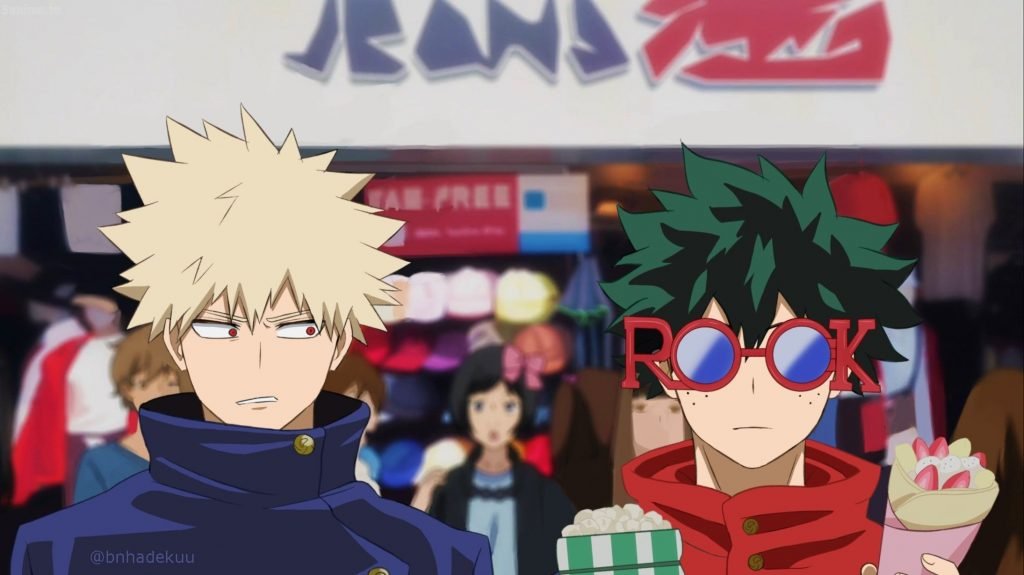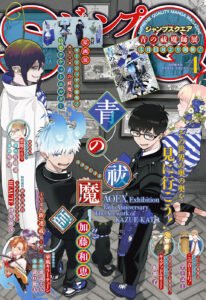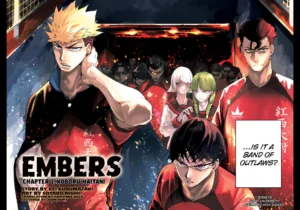
One of the most frequent discussions this year is, “Is Weekly Shonen Jump entering its darkest period?” This topic is not only debated here at Analyse It but also on Japan’s major manga forums, especially with the impending conclusion of Jujutsu Kaisen and My Hero Academia. Yesterday, forums like 2ch and Jump Matome opened threads to discuss this very subject.
The Japanese quickly began sharing their thoughts, which I’ll divide into the three main topics discussed by readers of the magazine and visitors to these two major forums. It’s important to note that this is a SUMMARY of the discussion: “After My Hero Academia and Jujutsu Kaisen end, Jump is seriously in trouble. Are we entering the darkest period ever?” (In the thread, they use the term “逝く,” formally meaning “to pass away”, but here used informally as “in big trouble” or “doomed.”)
Some people agreed that the magazine would “sell less than Sunday” when One Piece ends, while those who aren’t One Piece fans commented that with the conclusion of Jujutsu Kaisen and My Hero Academia, they see no reason to continue reading Weekly Shonen Jump. I estimate that around 25% to 35% of the comments had a more negative tone, concerned about Shonen Jump’s ability to find new hits or turn its recent manga (like Sakamoto Days, Akane Banashi, Ao no Hako, and Kagurabachi) into major commercial successes after receiving anime adaptations.
However, for most Japanese in the thread, Weekly Shonen Jump isn’t really in trouble. One of the main points of discussion was about the titles they enjoy. Each participant mentioned a different manga without an anime adaptation that, in their opinion, would save Weekly Shonen Jump, showing that readers’ tastes are quite spread across the various anime-less series the magazine currently offers (which is very positive). The first comment even stated, “It looks like Sakamoto Days will take the role of second-in-command/pillar”, putting hope in that work.
Other names quickly followed: “I think it will be One Piece, Sakamoto Days, Witch Watch, and Akane Banashi”, followed by another reader who pointed to “Nue no Onmyouji”, “Kagurabachi”, and “Exorcist no Kiyoshi-kun” as interesting picks. Many comments mentioning Kagurabachi as a possible savior were also written. The list of names continued to grow in both the 2ch thread and the Jump Matome comments section, with some people mentioning Ruri Dragon, saying the new arc will “save Weekly Shonen Jump” and that the series should return to the physical magazine rather than just being published digitally.
Many jokes and serious comments about One Piece were also made: “One Piece is still in the magazine”, “Now they’re going to delay One Piece’s conclusion by 10 more years”, “I think I’ll only cancel my subscription when One Piece ends”, showing that many feel secure as long as One Piece remains in the lineup. Overall, the concern about the magazine “ending” when One Piece finishes exists, but it’s also seen by many as an exaggeration from people who don’t read other magazines and aren’t aware of the Line-Up in magazines like Magazine or Sunday, which are in a worse situation when it comes to big manga.
Personally, I agree that this comes from a huge amount of sensationalism from people who always say, “IT WILL BE THE END OF SOMETHING.” It’s very common: How many times was the radio declared dead? How many times has Venice “sunk”? How many times has the world ended? As I’ve explained several times here on the site, Weekly Shonen Jump has the most successful anime-less series in the market, and people in the thread joked about this exaggeration: “People always say Shonen Jump is over”, “You always say Shonen Jump is over”, and I even saw a Twitter post mocking this panic: “Every ten years they say Shonen Jump is going to end.” There’s no denying that One Piece’s END will result in a significant drop in sales, but for it to sell less than Magazine and Sunday, those two would need to find a lot more new hits, which isn’t happening.
Others mentioned something that the “Media Expansion Chief Editor of Shonen Jump” pointed out years ago: Nowadays, series only explode in popularity with an anime adaptation. Because of this, some people consider that today, people don’t read the original manga until it becomes popular with the anime, right? Only those who read the magazine before Jujutsu Kaisen became popular with its anime should call this a dark phase for Jump.
Another comment added more to this: “These days, it seems like the trend is to only follow content that’s already become popular (meaning you don’t have to follow it from the start), whether it’s manga adapted into anime or other types of content.” This was followed by a few responses saying this was caused by the internet, lack of reading, or even claiming this is the “PROOF OF THE END TIMES” (don’t think the Japanese aren’t prone to exaggeration too).
The anime discussion continued with several comments about how the oversaturation of adaptations is stagnating sales for anime-less works, giving the impression that the magazine isn’t successful. However, I believe the most interesting discussions in this thread took place in the Jump Matome comments section, which spoke about the “Generation Shift”:
“Jump has always followed this kind of pattern: When Dragon Ball ended, people said there was nothing left to read in Jump, that it was finished. Then, ‘mid-level’ manga like One Piece and Naruto became popular, and Jump revived. Oh, so these kinds of manga are popular now, huh? During these times, the enthusiasm of (the older generation) for Jump cools as they age and realize their own tastes are becoming outdated as they grow up.”
Another comment continued this with irony: “It’s probably safe because the magazine is full of popular works… Jump has quick renewals, so themes arise regularly. Actually, this is just a sign you’re getting older, you know?” These opinions are common among readers over 30 or 40 who have seen these discussion cycles over the years. Meanwhile, the crowd that started reading the magazine after 2016 (so, within the last eight years) tends to be more panicked.
With Japan’s declining youth population, it’s natural for Weekly Shonen Jump to experience a drop in sales, but to see if the magazine is really losing readers, we have to consider its decline compared to other shonen magazines (like Shonen Magazine and Shonen Sunday) and the sales of shonen series volumes. For now, Weekly Shonen Jump follows the population trend, leading to a natural reduction in shonen magazines aimed at teenagers. We’ll have to see if, with the end of Jujutsu Kaisen and My Hero Academia, we’ll witness a more significant decline in the fourth quarter of 2024 compared to other magazines.
To conclude, some people raised the topic of Jump+ becoming the main platform, but whenever someone mentioned this, there were also counterarguments saying that Jump+ has stopped finding new hits (with a worse record than Weekly Shonen Jump), so the platform is in the same or worse position than the magazine. This topic is more controversial, as before the pandemic, Jump+ was seen as a replacement due to its great results, but since 2022, the platform hasn’t been able to find new commercial hits, cooling off the discussion. At the same time, Weekly Shonen Jump has launched Akane Banashi, Ruri Dragon, Nue no Onmyouji, and Kagurabachi.
Following research and industry reports, we can see that there’s no prediction for the end of physical manga media, whether in magazines or volumes, as, like with books, there will always be a significant portion of people who prefer consuming physical media for reading. So, the debate that Weekly Shonen Jump will end and only Jump+ will remain is becoming more outdated (and less frequent), but it still exists.
In conclusion, Japanese readers have various opinions on the topic, discussing several factors that could influence the magazine’s sales and the discovery of new series. Yes, there is a group very concerned about the FUTURE of Weekly Shonen Jump, but there are also many who are still calm for now, either because they believe in the current manga in the magazine, because One Piece is still in the Line-Up, or because they trust in the ongoing generational renewal that the magazine always undergoes.




